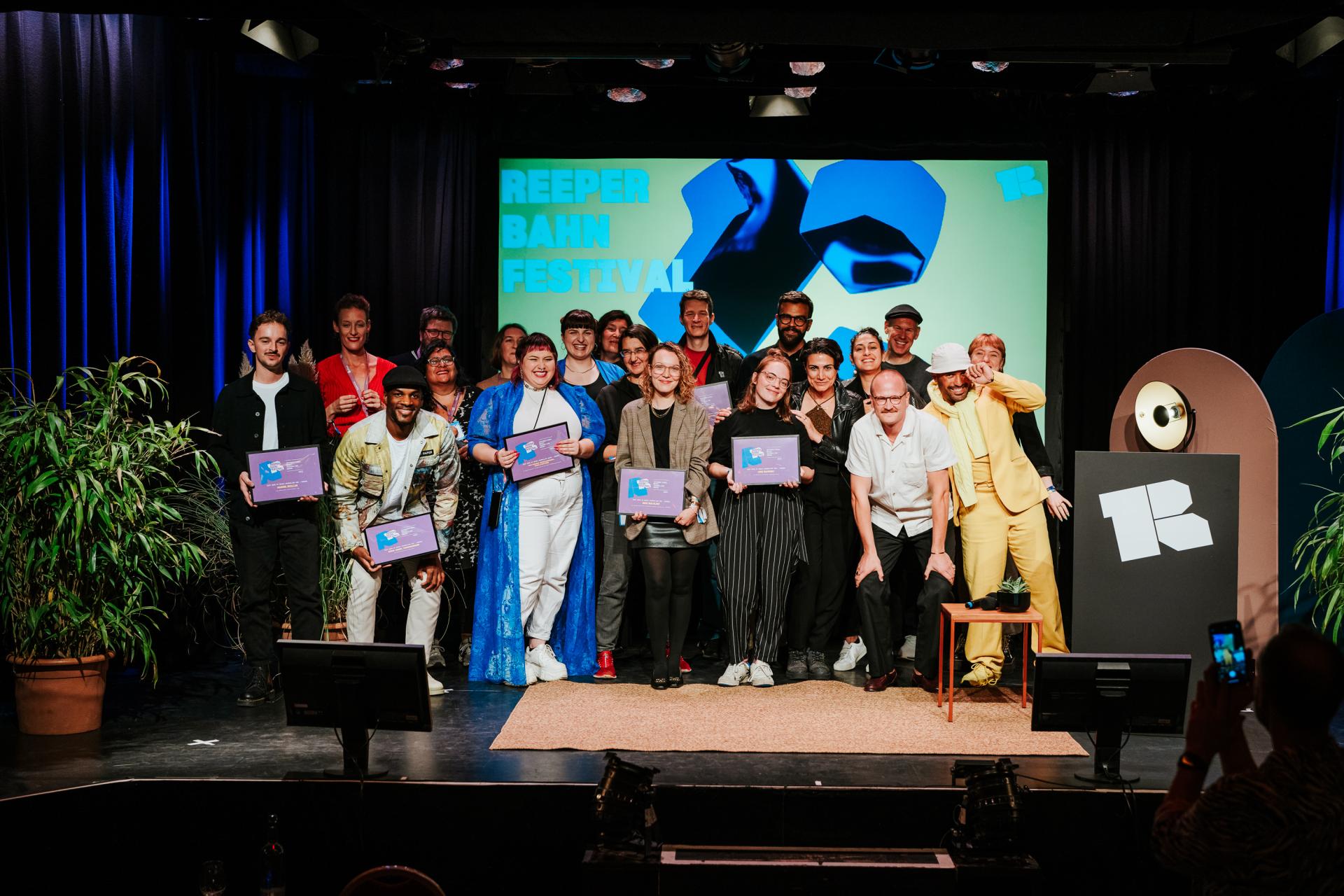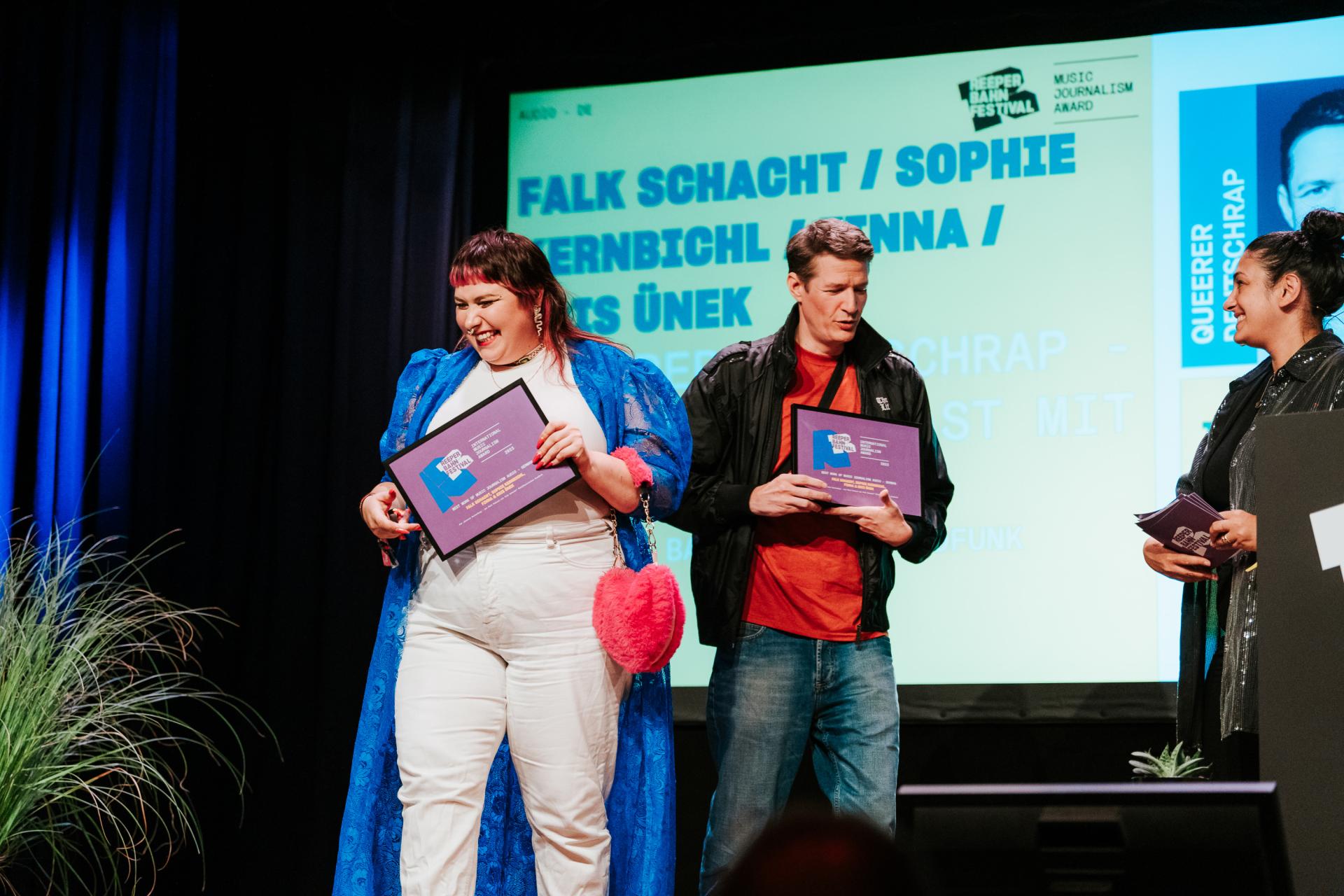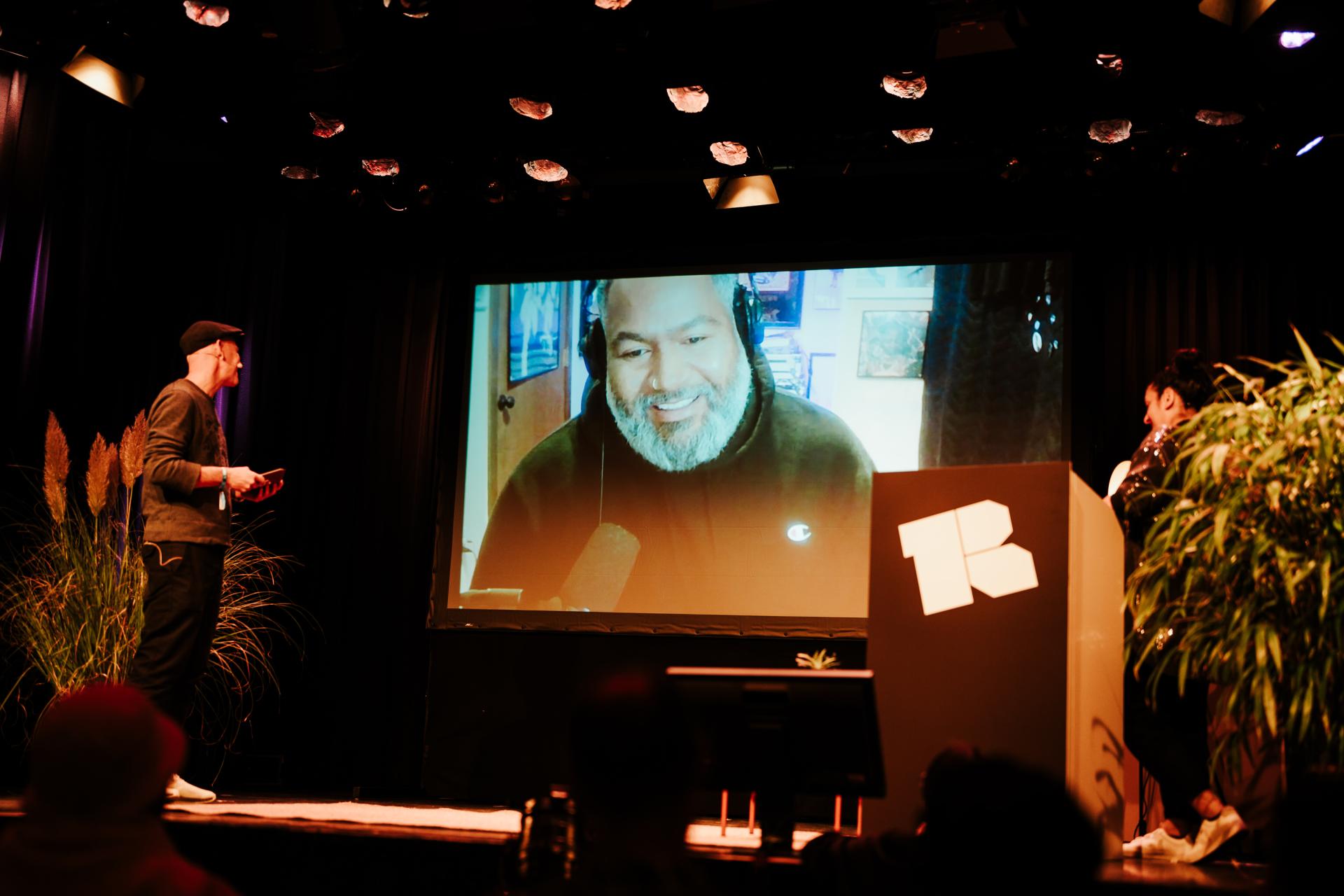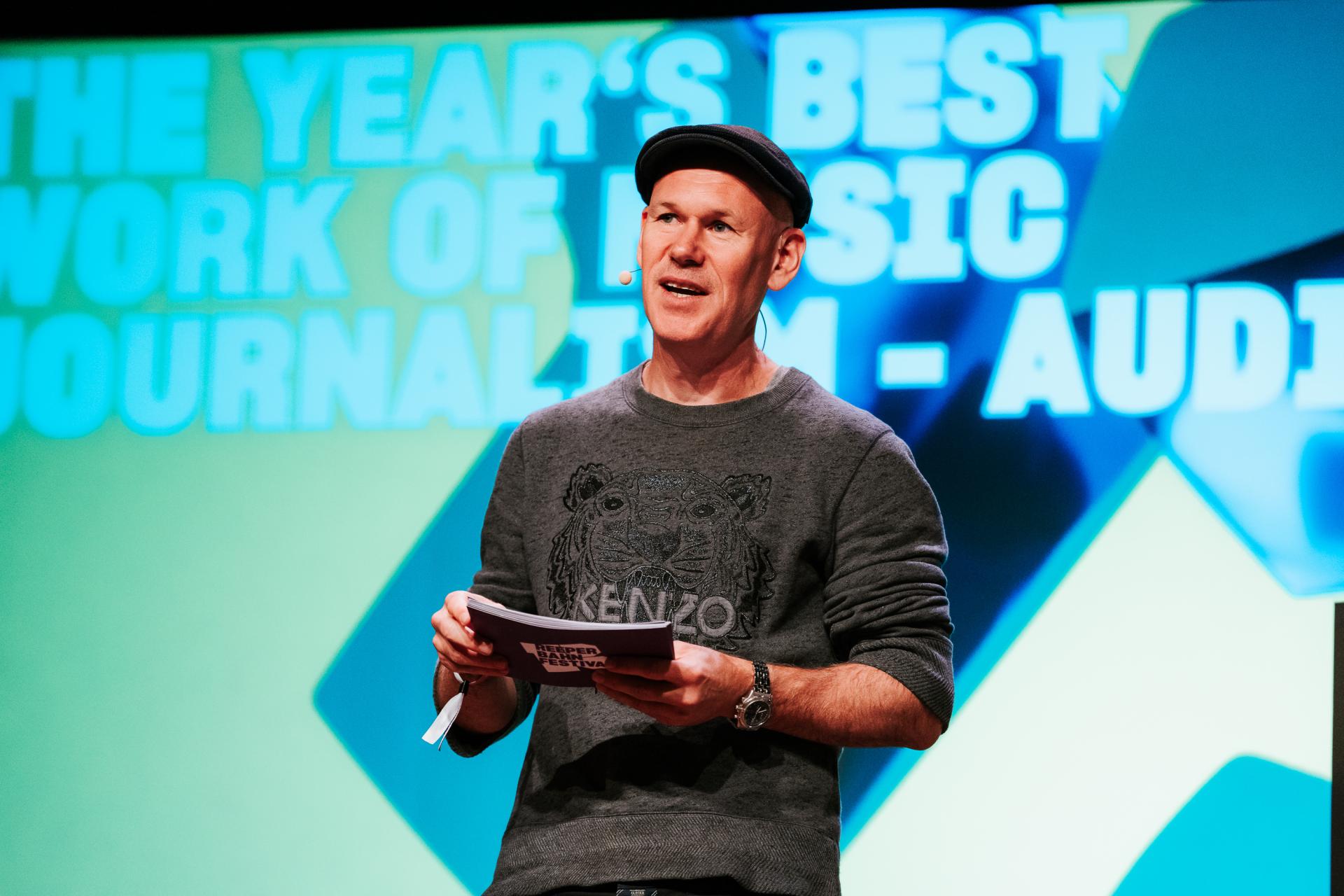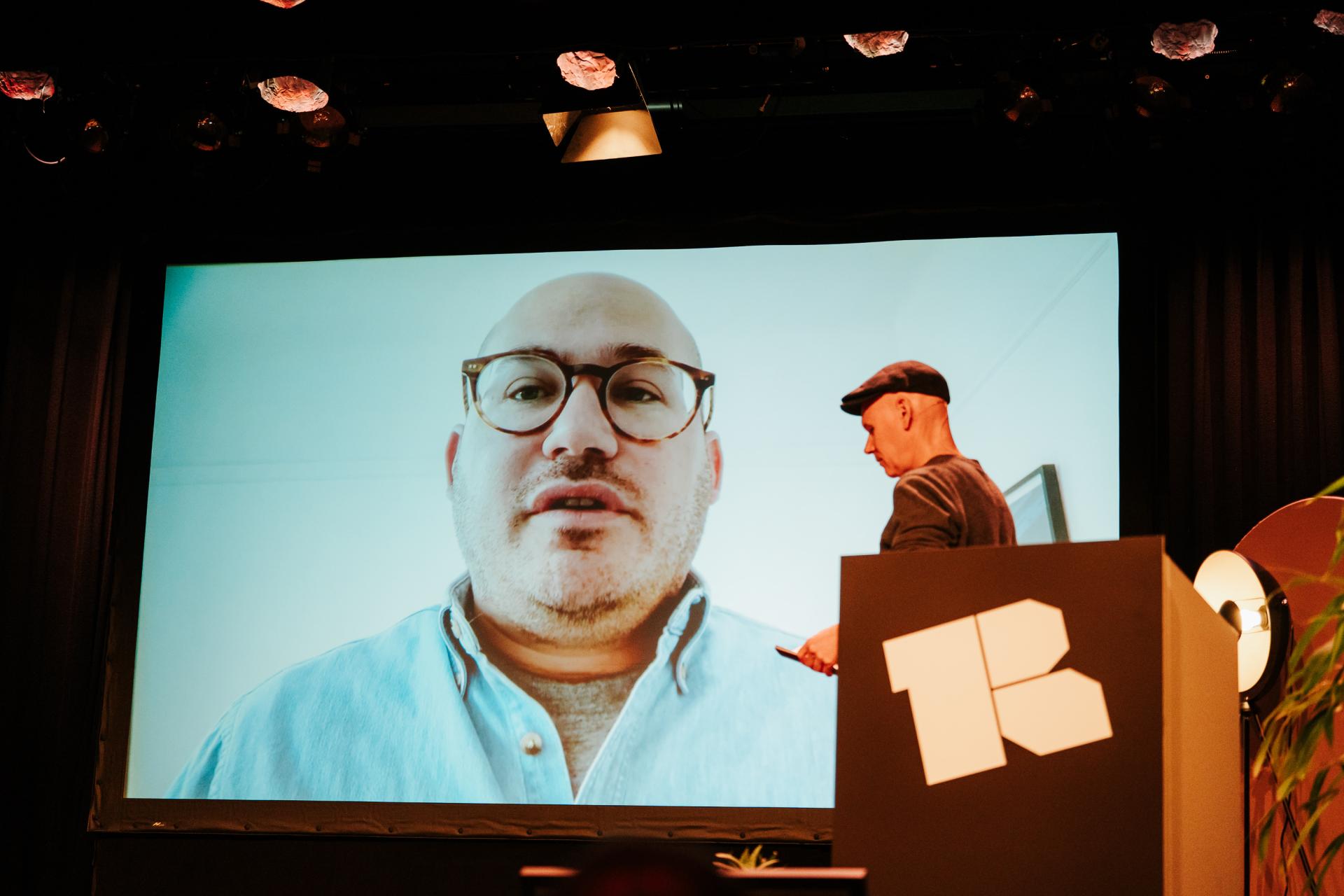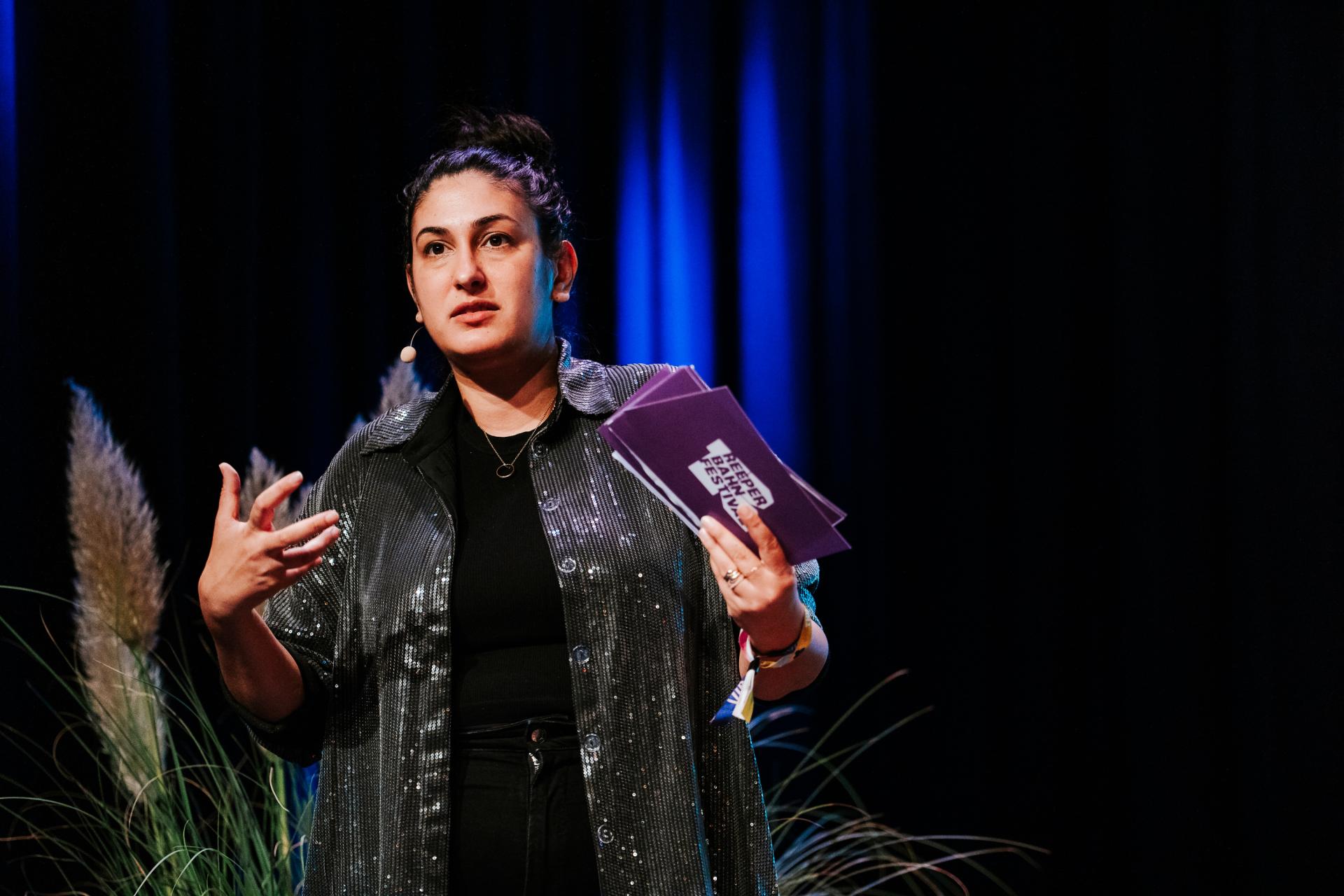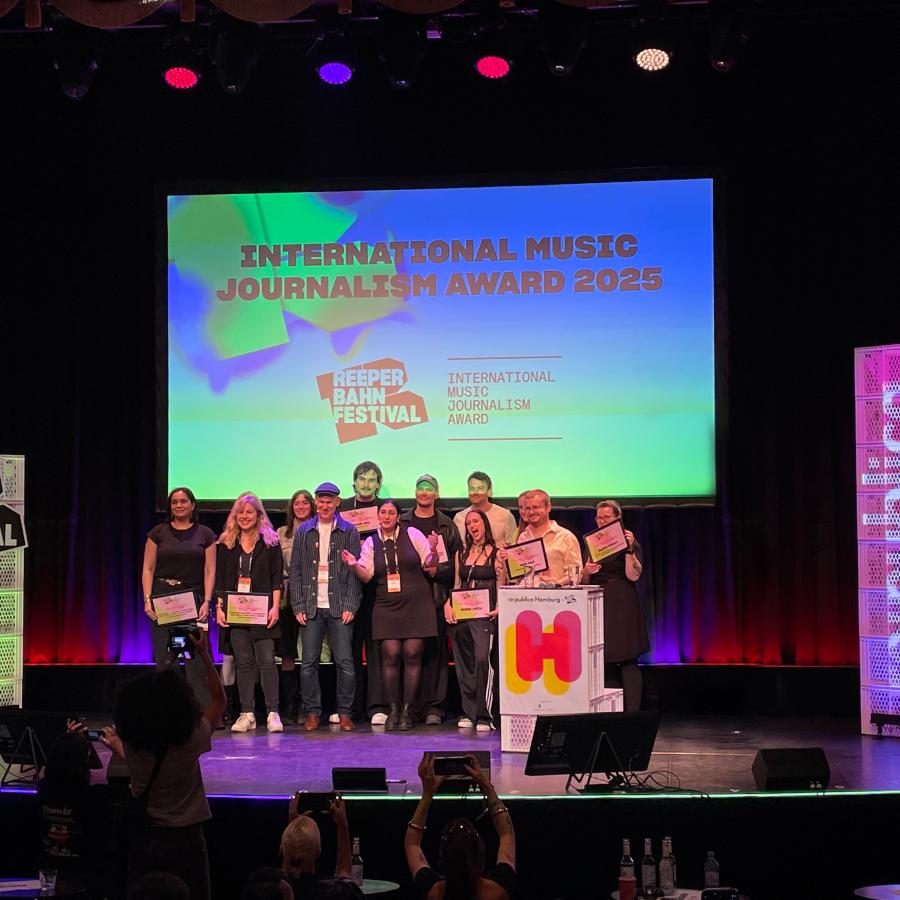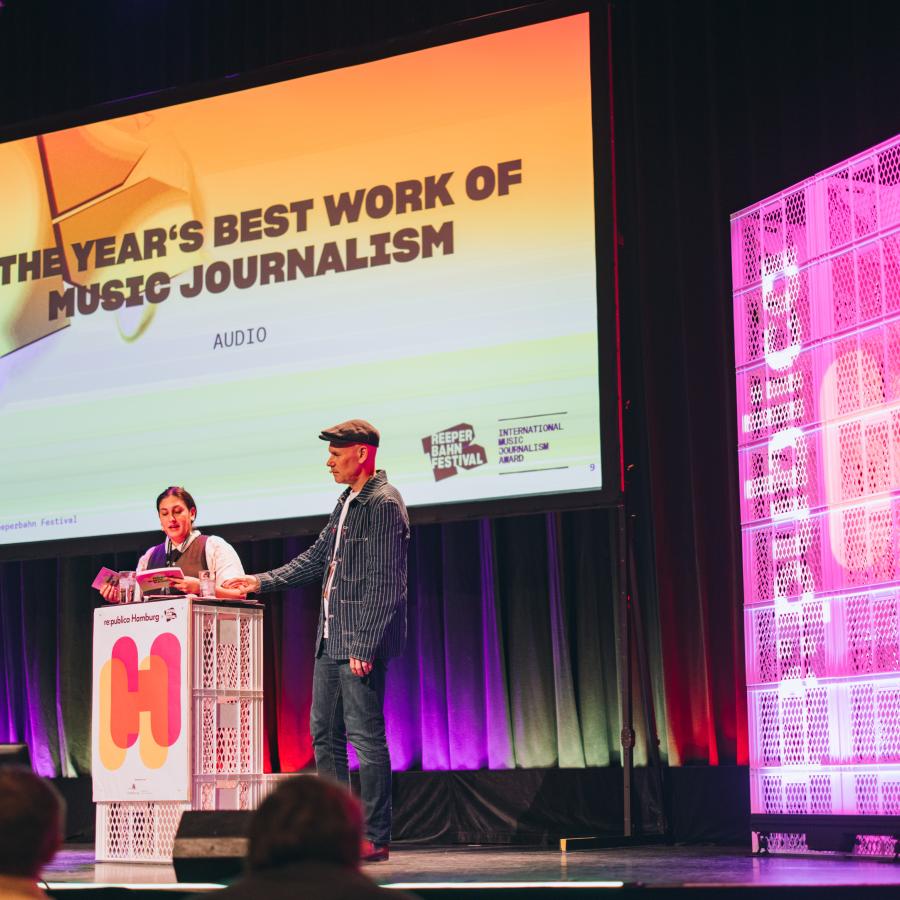International Music Journalism Award
Find here all information about the IMJA, the Winners Archive and our 2025 IMJA Nominee Shortlist
IMJA Winners 2025
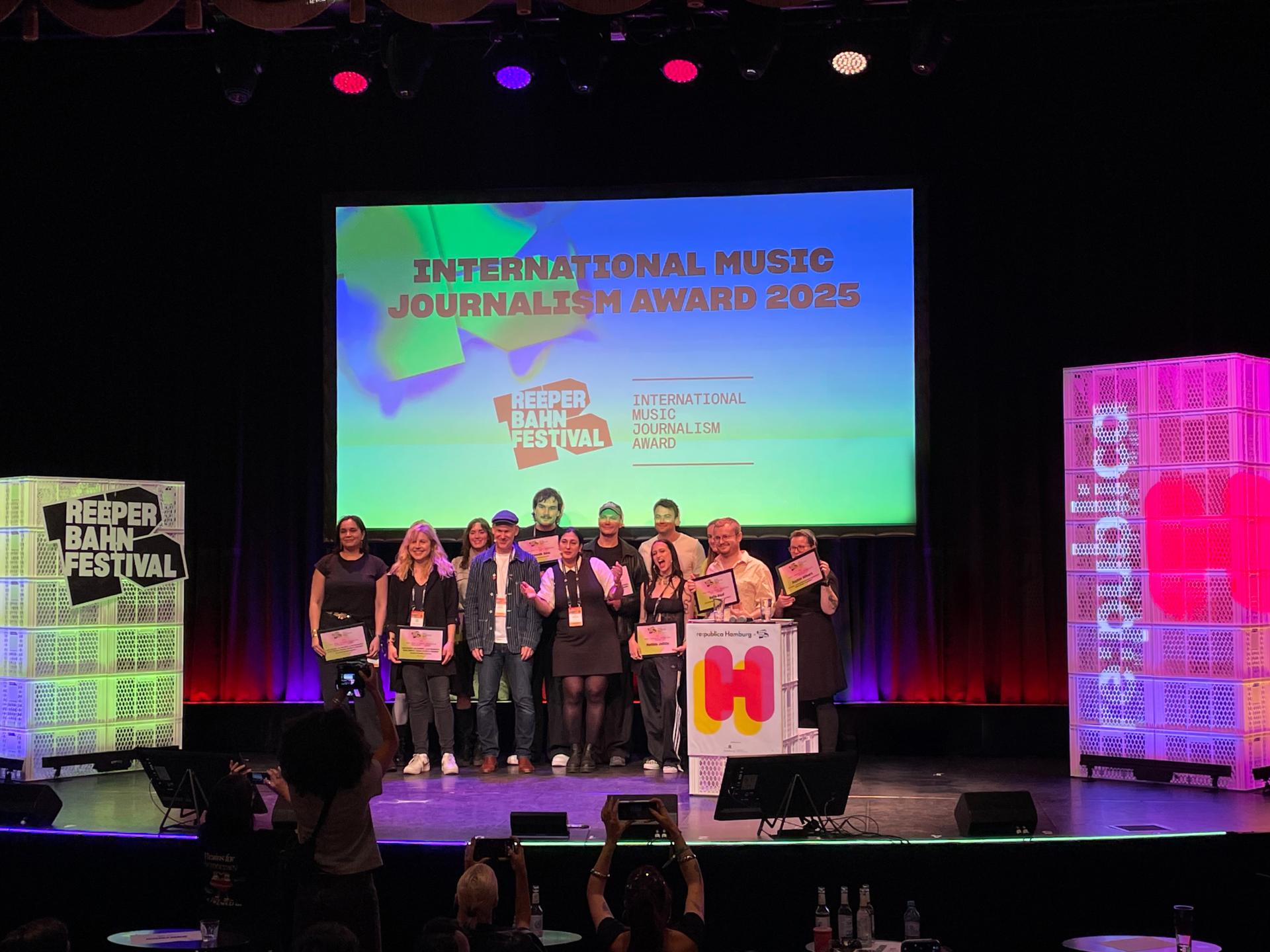


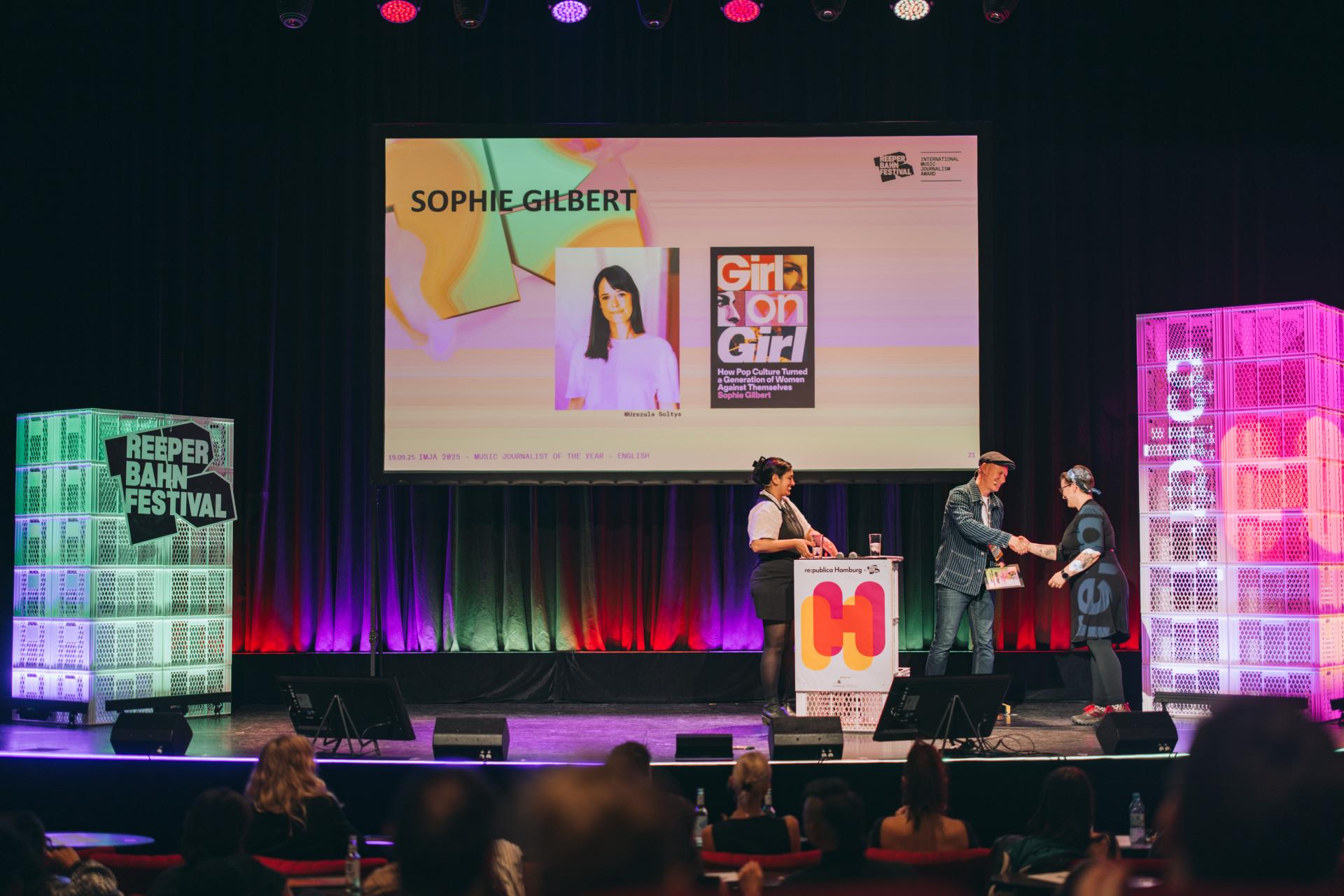



2025 IMJA Nominee Shortlist
About
In 2025, we were presenting the International Music Journalism Award for the eighth time!
On Friday, 19 September 2025 at the Schmidt Theater, Hamburg, we celebrated the IMJA winners at the end of this years's re:publica Hamburg x Reeperbahn Festival and honoured all those who report on pop culture and the music industry with a clear view, creative formats and a good portion of passion.
Why are we doing this? That's because quality music journalism is a vital component of a diverse and vibrant cultural landscape. The world of pop culture and the music industry is constantly evolving – socially relevant, multilayered, and dynamic. It takes voices with depth, conviction, and enthusiasm to tell these stories and to provide context, critique, and inspiration.
We know that high-quality, critical journalism doesn't emerge in a vacuum. Cultural journalism, in particular, faces immense financial, structural, and content-related pressures. Many long-established publications are struggling to survive, making it difficult for emerging journalists to enter and build long-term careers in the field of music journalism.
That’s why we present the IMJA: to recognize outstanding individual works, consistent relevance, bold new formats, and journalistic voices that set benchmarks in the field. We place a special focus on journalists under 30, who are shaping the journalism of tomorrow with fresh perspectives and new approaches.
Awards will be presented in the following categories:
- Best Music Journalist of the Year (in German & English)
- Best Music Journalistic Work of the Year (in German & English) in the following formats:
- Text (Print & Online)
- Audio
- Multimedia
- Best Music Journalistic Work by an Author Under 30 (in German only)
Who can take part?
You can submit journalistic work that deals with pop culture and/or the music industry in all its dimensions – whether focused on artists, scenes, concerts, economic developments, or social debates related to music. Submissions can be made by the authors themselves or nominated by others. So if you’ve come across a piece that stands out, we warmly invite you to nominate it for the award.
To be considered by the jury, submissions must meet the following criteria:
- Content Focus: Your work should center on pop culture or the music industry. This could be a portrait, a festival report, an analytical essay, a podcast on streaming trends, and much more.
- Public Access: The work must already be published and publicly accessible – whether in print, online, radio, TV, podcast, or as a multimedia project.
- Works published between July 1st 2024 and June 30th 2025 can be submitted.
For the category Best Music Journalist of the Year, we don't just assess a single piece, but the ongoing journalistic contribution. We’re looking at how the journalist contributes over time to the quality, visibility, and depth of music journalism. We’re particularly interested in personalities who stand out through expertise, integrity, and impact.
No further applications can be accepted for the IMJA 2025. The opening of the application period for IMJA 2026 will be announced here.

re:publica 25: Christian Tjaben - Der International Music Journalism Award 2025 @ Reeperbahn Festival (German)
What can music journalism do in times of streaming algorithms, generative AI texts, social media influencing, too little pop culture criticism in public broadcasting and too many podcasts?
Presenter and Reeperbahn Festival Conference curator Christian Tjaben explains the importance of the IMJA at the start of the 2025 edition.
(German)
Winners Archive
Best Music Journalist of the year (German): Julia Lorenz (Author / Editor (Zeit Online))
Writing a eulogy for Julia Lorenz is sheer joy. On the one hand. On the other hand, you have tied yourself to an exorbitant amount of time-consuming madness with this task: Hardly any other colleague has published text after text after text in the past year as steadily as Julia Lorenz, and every single one of them very emphatically invites you to get stuck in, to read a little further, a few more lines, just to finish this paragraph and the next ... welcome to the rabbit hole.
Regardless of whether Julia Lorenz publishes at Zeit Online, in her column at the Musikexpress or in any other medium that hopefully feels kissed by happiness, regardless of whether she writes about political or social issues, about climate or about art, about edifying or disgusting things: it never seems as if she is just doing a job. Lorenz always writes with heart and soul, with interest in and respect for her subjects, just as she does for her readers. Yet formulated with an unaffected, casual elegance that could drive one into naked envy, it is not the pleasure of reading that soothes.
Fortunately for all of us, Julia Lorenz repeatedly uses her many talents to write about music. Knowledgeable and illuminating, she discusses artists, their albums, trends and developments in the cultural scene, thus broadening many a horizon. By the way, her top three favourite albums of last year were by Rosalìa, Shygirl and Lucrecia Dalt, so she still has taste. It's actually cheeky!
For the Jury: Dani Fromm
Best Music Journalist of the year (English): Emma Warren (Author, Publisher)
UK dance and club culture gave the world, through all those decades, not only the most exciting music styles to shake our chic behinds to, from lovers rock to drum &bass, from dubstep to grime, from synth pop to UK garage - it also generated some of the finest, passionate, informed, opinionated and yes, also very funny and entertaining music writing. For example in magazines like the brillant Jockey Slut back in the 90ies, co-founded by this years winner of the award for International Music Journalist Of The Year: Emma Warren. She has written tons of texts for all the top papers like the Guardian, Observer, The Face, Fader, MixMag and so on, podcasted, lectured, curated on all kinds of high-profile platforms. Plus written a couple of great books, of which her latest, „Dance Your Way Home: A Journey Through The Dancefloor“, made us decide that it’s finally time to honour her with this award. In the book, she tells her personal dance history from a time before she even went to school, through the times when her life was aligning more and more with all the dynamic dance developments in the UK from the late 80ies on, starting with Acid House all the way through the junglist 90ies and what else there was - she saw it all, processed it all, covered it all and danced her way right through it, up to the present, where she is still dancing, now enjoying the modern types of dance culture for all ages, communal forms of getting down together that appear at the same time brand new and totally ancient. May the legendary Emma Warren keep on dancing and writing for a very long time!
For the jury: Hans Nieswandt
The Year's Best Work Of Music Journalism (Text - German): Lena Bammert (Die Welt ist eine Scheibe - Süddeutsche Zeitung)
With her text, Lena Bammert takes us into the world of a female DJ who makes a point of not being called a DJane. She has come a long way to be taken seriously as a woman with a migration background. Who started out in a shoe shop and is now booked as DJ Sedef Adasï for regular sets at Berlin's Berghain and Munich's Blitz Club, among others.
As a freelance journalist for the major dailies and weeklies, Bammert writes "about everything", as her profile at "Die Zeit" puts it. In her "SZ" story "Die Welt ist eine Scheibe" ("The world is a disc"), readers sense that they are not dealing with a pure music nerd, but with an author who in her portrait deals with people in a magical way . She is interested in her protagonist's origins, her upbringing, her family's culture and her versatility. For Sedef Emini, who started DJing at the age of 15, but who also makes music herself. Who, after 15 years of working in a man's world, finally found success two years ago.
Bammert takes us on a journey through a life from teenager to adult woman. She shows us an inside view, lets us experience the story of her heroine. One does not want to stop reading.
For the jury: Susanne Baller
The Year's Best Work Of Music Journalism (Text - English): Matthew Schnipper (The Sound of Grief - The New Yorker)(
What is music journalism? Every year we ask ourselves this question. What is music journalism today? What is it good for and what does it achieve? What can it achieve? And what should it achieve?
Answers, there are as many as there are fantastic examples of writing about music. But sometimes, sometimes there is this once piece that stands out. That makes you feel the music, yet manages to transcend it, too, aiming for a higher truth that can be found beyond the sound, the lyrics, the craft itself.
In his very personal essay „The Sound of Grief“, published in the New Yorker, Matthew Schnipper achieved exactly this. In it, the New York City-based writer and editor with bylines at The Fader, Pitchfork, GQ or New York Magazine, explores the loss of his 22-month old son, through the music he, Matthew, grew up with, the music that helped him through his youth, the music that inspired his son’s name, Renzo Rollins Schnipper, the music he shared with him, the music Renzo loved, the music Renzo clapped and smiled to – and the music Matthew could not listen to anymore after his son passed.
“The Sound of Grief” is an emotional gut punch. But it is clear that it is not written for the sake of delivering a gut punch, or for the sake of raising the writer’s profile. It is a courageous piece of writing where the pain of the writer shines through, and the weight that he and his partner carry is felt by the reader. Matthew achieves the rare feat of organically linking the personal, the musical, and the transcendental into one stunning essay that will leave every reader a different person than who they were before they began reading it.
For the jury: Aida Baghernejad
The Year's Best Work Of Music Journalism (Audio - German): Falk Schacht / Sophie Kernbichl / Finna / Edis Ünek (Queerer Deutschrap - der PULS Podcast mit Falk Schacht- PULS / Bayerischer Rundfunk)
The anniversary "50 years of Hip Hop" in 2023 also raises the question of what can be added to this history nowadays without repeating the same anecdotes in variations? The podcast "Queerer Deutschrap" by Puls (Bayrischer Rundfunk) achieves this in an impressive way by devoting itself to a topic and a group of people who have helped shape hip hop but have received far too little attention for decades. Falk Schacht, Sophie Kernbichl and their guest Finna focus on these queer perspectives in the podcast "Queerer Deutschrap" and give the protagonists the space they deserve.
Over the course of six episodes, they analyse, for example, together with rappers like Ebow, Lia Sahin, Sir Mantis, Sookee or Kay Shanghai, what role homophobia and toxic images of masculinity play and why such images of masculinity are particularly pronounced in rap.
It also tries to get to the bottom of more fundamental questions: What characterises queer rap in the first place and which different perspectives belong to the LGBTQIA+ community? Above all, this podcast also proves: queer acts and perspectives have been part of the discourse of "hip hop" from the very beginning. For this - despite the title "Queerer Deutschrap" - an intensive look is also taken at the history of the genre in the USA or UK.
The question of why once again a white "cis" man should explain the world to us / tell us this story again occupied the jury a lot. In the end, we were convinced by the fact that in all six podcast episodes, it is primarily the queer protagonists who have their say, and the male show host comes across more like a host who gives his guests space and range without appearing patronising or lapsing into mansplaining. And also because he asks himself self-critical questions and uses his own past as a negative example. The podcast is an asset for all those who are open to learning and acting differently in order to be an ally for queer artists.
The jury would like to explicitly highlight and award the team effort of all podcast protagonists.
Every hip hop fan should have heard this podcast.
For the jury: Jessica Hughes & Elissa Hiersemann
The Year's Best Work Of Music Journalism (Audio - English): Larry Mizell, Jr. (50 Years Of Hip-Hop - KEXP)
2023 is – as we all know – the year hip-hop turns 50 years old. At least a party that took place in the Bronx on August 11, 1973 was collectively chosen to mark the birth of the genre. KEXP, the public radio station from Seattle, Washington, is using this anniversary as an opportunity to celebrate the art form and cultural practice in its various forms and its protagonists with the multi-part, year-long podcast series 50 Years of Hip-Hop. Host Larry Mizell Jr. and his colleagues from KEXP take us on a journey that shines a spotlight on important musical milestones as well as sideshows and underground phenomena in hip-hop culture, and which also allows numerous contemporary witnesses to have their say.
We learn for example that Blondie were among the first allies in hip-hop culture, bringing rap onto mainstream radio and rappers like Fab 5 Freddy into the spotlight with their number one hit Rapture in 1980. We learn how scratching was invented or to what extent hip-hop crews in 1984 were influenced by Prince or Kraftwerk and as a result electro-rap dominated the scene. We learn how the Palestinian crew DAM uses hip-hop to change existing conditions in their homeland. We celebrate the innovative sound of Missy Elliott that ushered in the millennium or take a deep dive into the album Speakerboxxx/The Love Below, OutKast's magnum opus from 2003 – and the last album to win a Grammy in the Album of the Year category.
And most importantly, we learn that even before the infamous August 11, 1973, there was an emerging DJ culture and legendary block parties in New York, where DJs like DJ Hollywood, often overlooked in hip-hop historiography, changed the art of partying forever by playing with two turntables in parallel and putting their own lyrics over the music and breaks.
The podcast series 50 Years of Hip-Hop is a wild, educational and first and foremost entertaining ride through half a century of music history, which once again illustrates how the underground culture of marginalized African American and Latin kids emerged into the dominant player in pop culture today.
For the jury: Katharina Grabowski
The Year's Best Work Of Music Journalism (Multimedia - German): Julia Schweinberger / Lennart Bedford-Strom / Friederike Wipfler / Anne Brier / Sammy Khamis (Dirty Little Secrets - ARD Mediathek)
The collaborative work "Dirty Little Secrets" by Julia Schweinberger, Lennart Bedford-Strom, Friederike Wipfler, Anne Brier, and Sammy Khamis is a multifaceted approach to storytelling. Through the artful combination of text, audio, video, and visuals, this team has crafted an immersive experience that transcends the confines of traditional journalism.
Their work reminds us that music is not just about the notes and lyrics but also the lives, struggles, and triumphs of those who create it.
In a world where music journalism often focuses on the glitz and glamour, "Dirty Little Secrets" serves as a poignant reminder that there is depth and complexity beneath the surface. It encourages us all to explore the layers of music and the stories that remain hidden from the spotlight.
Congratulations to Julia Schweinberger, Lennart Bedford-Strom, Friederike Wipfler, Anne Brier, and Sammy Khamis on this well-deserved recognition!
For the jury: Niloufar Behradi-Ohnacker
The Year's Best Work Of Music Journalism (Multimedia - English): Sophia Jones / Nidzara Ahmetasevic / Milivoje Pantovic (The DJ and the War Crimes- Rolling Stone/Starling Lab)
The article "The DJ and the War Crimes" by Sophia Jones, Nidžara Ahmetašević and Milivoje Pantović, published in Rolling Stone, is undeniably a masterpiece of investigative journalism.
These journalists have tackled an exceptionally sensitive and complex subject matter in their piece. They skillfully took readers on a gripping journey, shedding light on the painful reality of war crimes and their devastating human toll.
What makes this article remarkable is not just its meticulously researched content but also its impressive multimedia execution.
For their exceptional contributions to investigative journalism and multimedia storytelling, it is both a pleasure and a duty to honor Sophia Jones, Nidzara Ahmetasevic, and Milivoje Pantovic today.
Congratulations on this well-deserved recognition!
For the jury: Niloufar Behradi-Ohnacker
Best Work Of Music Journalism, under 30 (German)
Manuel Biallas Schwul im Rap - Limits in London - RBB
Cok Güzel. Superb. Impresionante! This podcast combines everything I want from young journalists: creativity, foreign countries, social criticism, rebelliousness and informativeness. Manuell Biallas manages to crank out a podcast project for the Berlin Brandenburg radio network, all while doing a full time traineeship at the Northern German radio and television network. Talk about multi-tasking and hustling! Using the umbrella term “Queer in Europe”, he manages to smoothly deliver stories about Swedish refugee policy, religious tensions in Italy, the history of the Romani communities in Bulgaria and also hip-hop in England. Although I found it a bit awkward, that right at the beginning of the entertaining podcast episode "Gay in Rap - Limits in London" he speaks specifically about Bengali, Vietnamese or Turkish, while the languages of the African continent are grouped together as "African languages". A mishap, that could have easily been avoided; this does not take away from the excellence of this work. In this episode, Biallas tells the story of two emerging artists in the UK. He chronicles the life of gay rapper Dennell and that of the queer skater Sheiva. I love that we get to hear the reporter ring the doorbell of the acts being profiled. I love how the reporter describes his surroundings. I love how the reporter explains to us what terms he uses and why. I love the music bits of rapper Dennel he chose to show us. Overall I am very pleased and I'm very proud! We want more projects like these!
For the jury: Malcolm Ohanwe
Rike van Kleef Wer gibt hier den Ton an? Warum Gender Imbalance nicht egal ist - MusikWoche
"The following article refers to sections of my thesis", Rike van Kleef prefaces her guest article in trade magazine MusikWoche. This also immediately explains the sober, completely un-flowery language which makes her treatise on "Gender Imbalance in Booking" (apart from its sad subject) not what is generally considered an enjoyable read. Nevertheless, we have found this text to be highly prize-worthy.
Far too often hysterical discussions break out before anyone has even checked the data. This is exactly what Rike van Kleef has done. Even though one could actually see with two pricked out eyes that FLINTA are still dramatically underrepresented in the music industry, she first proves this with solid figures, and only then dispels the myths of "lack of supply" and "lack of quality".
Scientifically established facts cannot be given enough space in heated times like ours. We regret that such a flaming plea for more gender justice in booking is still necessary. We want to remain confident that it will fall on more and more open ears. "I'm not prepared to wait another 132 years," concludes Rike van Kleef, and we fully concur.
For the jury: Dani Fromm
Ridal Carel Tchoukuegno Bloß keine Heartaches - Zeit Online
I embrace the fact, that we have reached a point within the German media world, where people who really have an understanding and expertise of musical genres beyond the the Western European and Anglo-American spheres from an early age have the opportunity to dissect, evaluate, discuss, praise and criticize music. Ridal Carel Tchoukuegno reviews Peter Fox's album "Love Songs" for Zeit Online. He very pointedly contrasts how Afrodrill, a genre influenced by British rap and West African pop among other things, is the soundtrack for dealing with poverty and violence for black musicians like Headie One or M1llionz and is an outlet for Peter Fox to describe personal development. A thoroughly informative and entertaining text. Even if he holds back with his opinion and evaluation of the music, which would be expected in a review, the text still works in its ability to summarize facts simply. Come thru Cameroon!
For the jury: Malcolm Ohanwe
Best Music Journalist of the year (German): Joachim Hentschel
Best Music Journalist of the year (German): Joachim Hentschel
Best Music Journalist of the year (English): Kaitlyn Tiffany
Technically, Kaytlin Tiffany is not actually a music journalist. Not in the sense that she reviews records, reports on concerts or meets musicians in hotels for interviews. She's not even really a pop journalist, because the many pieces she writes as a staff writer for The Atlantic are about all sorts of things that aren't necessarily or even exclusively pop. What she does have, though, and in an awesome way, is a pop sensibility. That means that whatever she writes about - take, for example, her Atlantic article about how everyone seems to be "toxic" these days - she looks at it with that pop sensibility, processes it, and then puts it into words. That makes her articles pop themselves, in the best possible way: highly insightful, highly entertaining, fast-paced and full of ideas, all at the same time. That's brilliant!
The masterpiece of the still young author from Brooklyn, and also the work that indeed qualifies her as music journalist of the year is her book "Everything I Need I Get From You - How Fangirls Created The Internet As We Know It" As a former fangirl of the boy band One Direction, she lays out here a wealth of facts and phenomena previously unknown to most people, especially males over 35, and interprets them in startling ways. The (buying) power and importance of fans in itself is not a new discovery, of course, but the way that fandom has accelerated and changed in the digital age, how this has changed the nature of the internet for better, for worse, and in general, and the observation that most of that change was actually voluntarily and passionately driven by young girls in their spare time, while the guys were mainly watching porn and playing Counterstrike, is really quite touching and amazing.
Only a person who was part of the movement herself could observe it like that. This makes Kaytlin Tiffany, who actually writes mostly about technology and social issues, almost something of a pop person in her own right, a regular pop activist, which is what good pop journalists should be anyway. Congratulations, we look forward to many more years of first-rate contributions from this amazing talent!
For the jury: Hans Nieswandt
The Year's Best Work Of Music Journalism (Text - German): Annett Scheffel (Die feine Kunst des Draufscheißens - Musikexpress)
When an author manages to inspire readers with a portrait of an artist even though they have never been fans of her music before, when she arouses curiosity and entices them to listen to the songs again through her article, then she has achieved her goal. Annett Scheffel has achieved this with her piece on the New Zealand musician Lorde. She used the publication of her third album, "Solar Power", in 2021 to trace the development of the now 25-year-old, whose musical career had already begun ten years earlier.
Scheffel's text for Musikexpress, "Die feine Kunst des Draufscheißens", describes with a loving eye an artist who eludes the market and the social media world and only returns when she feels ready. In this way, Lorde represents the part of her generation that refuses to consume, buys second-hand and lives off-grid. Scheffel succeeds in panning between video call to New York City, depicting a dreamy young woman looking out the window during the phone call and telling what happens on the street between the Brownstones, and a scene change to the interview, in which Ella Yelich-O'Connor (Lorde) talks about New Zealand, her second home NYC, a trip to Antarctica and her genesis through music genres as well as looking at the really important things: Nature, friends, swimming in the sea.
Without Annett Scheffel, we would never have heard about it so sensitively.
For the jury: Susanne Baller
The Year's Best Work Of Music Journalism (Text - English): Hashino Yukinori (Okuda Hiroko: The Casio Employee Behind The “Sleng Teng” Riddim That Revolutionized Reggae - nippon.com)
Hashino Yukinori has written a very good text on an exceptionally great subject: "The Casio Employee Behind the "Sleng Teng" Riddim that Revolutionized Reggae." Starting with the catchy beat and preset sounds from "Under Mi Sleng Teng", the 1985 dancehall world hit by Jamaican singer Wayne Smith, he follows the history of the preset. The song's signature sound, programmed for the Casiotone MT-40 in the early 1980s, was used by Smith and co-writer Noel Davey as the basic building block of the hit. Jamaican digital dancehall is thus based on the preset rhythm pattern (Casiotone preset) of the pocket calculator manufacturer and was the work of a young developer who had a music theory education. Okuda Hiroku, whom the author of the text interviewed at length, thus stands for a crazy story between two continents. Debates about appropriation, chiselled history of technology, intercultural or nerdy expertise: Missing. Hashino Yukinori places this small music history in the big one, but tells his or rather "her" story straightforwardly and clearly. And rightly relies blindly on the really extraordinarily interesting material. He has succeeded in producing a readable, very informed and, despite its straightness, strangely touching text, which we hereby award.
For the jury: Mascha Jacobs
The Year's Best Work Of Music Journalism (Audio - German): Azadê Peşmen (Deso - Der Rapper, der zum IS ging - funk (ACB Stories und Qzeng Productions))
The story Azadê Peşmen tells is disturbing, confusing and captivating, but above all it is still unheard of in this depth and sensitivity. Yet the facts have long been known: Denis Cuspert made a name for himself as Deso Dogg in the Berlin rap scene, fell in with Islamist fanatics and joined the terrorist organisation IS. He preached hate, sang propaganda songs, committed atrocities in Syria and is almost certainly dead by now. Media reported years ago - only they rarely did so as carefully as such a complex and monstrous biography demands.
For almost five hours, Azadê Peşmen and the team from COSMO and ACB Stories lead us into Denis Cuspert's labyrinth of hopes, tensions and contradictions, and later into his abyss. Step by step, we feel our way forward: Islam and terror experts explain patterns, psychologists classify favourable factors. Former music colleagues share their incomprehension and family members their despair. Azadê Peşmen brings us closer to Denis Cuspert as a person than any blockbuster story before - and yet maintains the necessary distance at all times. Taking stance without expressing an opinion. Azadê Peşmen presents many perspectives, but always with the goal clearly in mind. Media- and self-critical. Self-confident, but also transparent about the limits of their own research. "Deso Dogg - the Rapper Who Went to the IS" is a gem of modern journalism.
For the jury: Christoph Lindemann
The Year's Best Work Of Music Journalism (Audio - English): Danyel Smith (Black Girl Songbook - The Ringer Network/Spotify)
In the multi-part podcast series "Black Girl Songbook", Danyel Smith brings us closer to African-American music history. A musical history that forms the basis of countless popular music movements of the 21st century, but is often misjudged as the driving force of pop culture. The skills, genius and virtuosity of African-American performers are also rarely contextualised in the media.
Smith's starting position is one that has a lot of catching up to do. “Black Girl Songbook” addresses intersectional discrimination. The work of Black women musicians is finally treated with the respect, care and depth that they deserve on a broad scale.
Danyel Smith is a music journalist and author, was the first Black editor at both Billboard Magazine and Vibe Magazine, where she later also served as editor-in-chief, and has worked for publications such as the New York Times, Entertainment Weekly and Time Magazine.
In her podcast, Smith deliberately breaks with the conventions of music journalism. “Black Girl Songbook” which Smith records in her bedroom for acoustic reasons, does not pretend to be objective, biographical stations are not recited one after the other and the work of African-American female musicians is considered outside a white mainstream discourse. In the most intimate way, Smith conveys connections, analyses and reclassifies moments in pop history, and then also plays the appropriate musical examples.
What’s really behind the stories Whitney Houston, Billie Holiday or Alicia Keys? Why should we look critically at genre designations like "neo-soul" and question genre boundaries in general? Danyel Smith addresses all these questions in “Black Girl Songbook”. And in doing so, she tells us with a flair and conviction that directly conveys the force and meaning of her narratives to us listeners. She also invites other players from the music business to share their perspectives. A far-reaching and long overdue survey and retelling of US music history. Smith catches up with what should have been caught up with long ago.
For the jury: Dalia Ahmed
The Year's Best Work Of Music Journalism (Multimedia - German): Mariska Lief, Wero Jägersberg (Dichtung und Wahrheit - Wie HipHop nach Deutschland kam - HR)
This documentary almost didn't make it into our ranking. I am very happy it did. The film manages to straddle the perfect fine line of showing German regional cultural prowess, providing entertainment, being educational as well as explicitly addressing ethno-cultural minorities in Germany. The HR (Hessian Broadcast) documentary series by journalists Mariska Lief and Wero Jägersberg outlines the influence of Frankfurt am Main and Hesse, as well as the influence of several rap musicians of color from the region, who have and will forever shape German pop and music culture. The authors managed to secure in-depth interviews with indisputable German rap heavyweights such as Azad, Sido, Moses Pelham, Sabrina Setlur or Haftbefehl. The documentary further sets in stone their icon status, which they as prime pioniers of German musical arts often do not get granted by the white mainstream. All interviews are adorned with fancy beauty shots of the individual star guests, which at some point you just really look forward to, and each episode ends with an appetizing teaser: The binge factor makes it's way to German public television! An insightful and fun journey through time through German pop culture history with a good mix of beautifully selected archive material, exclusive anecdotes, that have never been told and new footage.
For the jury: Malcolm Ohanwe
The Year's Best Work Of Music Journalism (Multimedia - English): Arthur Buckner, Linda Diaz (Why Is Brandy Called The "Vocal Bible"? - PBS)
We jurors in the multimedia category don't make it easy for ourselves. Again and again we discuss what exactly constitutes an outstanding music journalistic work in this category. Is it a particular technical innovation that distinguishes this genre? The story packed behind an app or AR glasses? To be honest, we are still in discussion here about where we stand and where this category could go.
What we could quickly agree on was that it's about journalistic contributions that know how to bring together - mostly visually - the facts to tell a story. But facts alone are not enough. The internet is for everyone. And anyone who understands how to explain a pop cultural phenomenon across genres and nations with protagonists who couldn't have been chosen more perfectly deserves the prize in this category.
The YouTube video "Why Is Brandy Called the "Vocal Bible"?" by Arthur Buckner and Linda Diaz makes music history come alive and fulfils all our expectations. Brandy Norwood, who went through the roof with her self-titled debut album "Brandy" in the 1990s, is honoured here as a singing talent and a role model for young black women all over the world. Away from any role-specific clichés.
Congratulations to all those involved here for this outstanding work!
For the jury: Niloufar Behradi-Ohnacker
Best Work Of Music Journalism, under 30 (German)
Alex Barbian (SINUS Podcast - SINUS)
SINUS has completely convinced us as a jury. Alex Barbian himself describes his podcast as a "music magazine to listen to", and that is exactly how he conceives it, and that is also how it feels when you listen to it: as if you are leafing through a music magazine.
The project's great strength lies in its multifaceted nature: although a proven rap expert, Barbian by no means limits his choice of topics to the hip hop scene, but also nerds out through indie, punk, pop, rock and whatever else seems worth listening to. Knowledgeable, open-minded and affectionate, he devotes himself equally to established artists and newcomers in the music business. In addition, he always lets the media and business side have their say.
The range of topics is matched by the range of contributions: SINUS contains interviews, portraits, reviews and retrospectives, conversations at eye level and - of course - lots of music tips. The listeners are provided with these in the form of an accompanying playlist that can be conveniently consumed.
The fact that this thicket of personalities, genres and formats, which grows wildly in all directions, does not look like undergrowth in the end, but like a well thought-out park, borders on a small miracle. It is due to the competence, the certainty and the unshakeable calm with which Alex Barbian has been guiding through this acoustic garden since autumn 2021. He designed it himself, laid it out and planted it, he keeps it in good shape and he waters it with his heart and soul: absolutely worth the price for us.
For the jury: Dani Fromm
Steven Meyer und Victor Pfannmöller (Tanz in die Freiheit - Russlands Ballrooms - MDR)
In collaboration with Victor Pfannmöller, Steven Meyer, who is actually mainly active as a writer, excelled in capturing a thrilling pop-political subculture in a 15-minute video report. The MDR (Central German Broadcasting Service) film shows how the African-American gay and trans* dance form of voguing has prevailed in Russia despite the conservative and hostile attitude towards homosexuals in the mainstream there. The only 21-year-old student and voguing dancer Alex is portrayed in a very dignified and yet very intimate fashion. The authors manage to make the very young protagonist feel comfortable and speak freely about his sexuality and his family in a country where there would be many reasons not to do so. The film avoids insensitive anti-slavic clichés that we often see in German media and nevertheless deals critically with Russia's homophobic politics, but it also shows its colorful LGBTIQ community. The video footage of the Russian Ballroms are the absolute highlight of the film. The dance shots from the intro to the end stun with their aesthetics. The dramaturgical structure, which leaves as a cliffhanger whether Alex will win his next ballroom competition, also provides an exciting viewing experience.
For the jury: Malcolm Ohanwe
Walerija Petrowa (Der Aufstieg von Harry Styles - Zwischen Hype, Männlichkeit und Queer-Baiting - Brust Raus (SWR/DasDing))
Why do we all seem to love Harry Styles at the moment? Walerija Petrowa explains it on the YouTube channel „Brust Raus“ („Chest Out“), which she hosts together with colleague Aurora Lu. And she does this with at least as much depth as humour. Taking Harry Styles as an example, she discusses topics such as structural racism, masculinity, sexism and queerbaiting, explaining the terms also for those, who haven’t yet heard of these discourses before. With „Brust Raus“, the two young public broadcasting journalists and their team aim to empower their audience by analysing pop cultural themes and issues with a lot of verve and together with their community. And with their weekly curated playlist they also deliver a matching soundtrack.
For the jury: Aida Baghernejad
Best Music Journalist of the year (German): Aida Baghernejad (Musikexpress, taz, tip berlin)
In 2019, I already said: remember the name Aida Baghernejad. If someone can make the unwieldy word "intersectionality“ glitter in rainbow colours as if Stuart Hall were a lesbian Asian woman and you were a Muslim gay guy who thought he'd lost faith in the power of pop cultural representation, we have a lot to look forward to from them. London-educated, Berlin-based writer and podcaster Aida Baghernejad has won our award for a piece of music journalism before. This year, we are honoured to present her with the Music Journalist of the Year Award. The millennial has since started the podcast "Pasta und Politik" and writes for FAS, taz, kaputt, SZ and Musikexpress about food, pop, feminism and politics. Sometimes about everything together. But what I appreciate most, besides her great texts, is that she actually does politics and doesn't just write about it. She is involved with the Friedrichshain Green Party, very pragmatically and practically. I believe every word she says and will follow her everywhere. She’s also writing a PHD about street food and clearly positions herself as an anti-fascist. Congratulations, Aida, you Topcheckerbunny.
For the jury: Mascha Jacobs
Best Music Journalist of the year (English): Stephanie Phillips (Independent, The Quietus, Vice, Bandcamp ,The Wire, Buchautorin von "Why Solange Matters")
Stephanie Phillips is a freelance arts and culture journalist who writes not only about music, but also about life as a PoC in a society dominated by white people. In May 2021, the thirty-year-old published a book in the series Music matters and dedicated "Why Solange matters" to Solange Knowles, Beyoncé's "little" sister. Phillips, a Brit and Londoner by choice, has published in "The Independent", "The Quietus", "Vice", "Bandcamp" and "The Wire", among others. As a musician, she provides guitar and vocals in the three-member Black and feminist punk band Big Joanie; a solo project appeared under the name Stef Fi in 2020.
Phillips is committed to Black Lives Matter and the LGBTQI community. She fights back against stereotypes and stigmas not only on her Twitter channel. In her life, everything is interwoven - and in her love of music she has found her calling as well as her profession. In Phillips' book about Solange, the author integrates the singer into her own life as well as the significance of other Black artists, including her own punk culture circle. With her call for freedom, Phillips provides, as the Guardian writes, "a vision of a new world that she hopes Solange would be proud to be a part of". As a counter-design to a world in which "black creatives are oppressed and racism is ignored in the scene".
What is so particularly touching about Stephanie Phillips is her authenticity and the closeness of her own life to the issues she addresses. What impresses me is her view of the bigger picture. As the daughter of a father who immigrated to Britain from Jamaica and grew up in a white British neighbourhood in the Midlands, she describes her experiences of being invisible in moving recollections - in a book about Solange Knowles! These recollections sound like a blueprint that can be applied to the lives of many people who continue to be disadvantaged by our society.
For the jury; Susanne Baller
Best Music Journalist of the year (French): Jean Morel (Grünt)
Thanks to his own media – Grünt – Jean Morel has become one of the most important faces of French rap journalism. Grünt has various contents, from freestyle to interviews or even reports. Those contents have led Grünt to be an essential platform for the rap industry and rappers. Jean Morel is able to show us all the different aspects of hip hop culture.
Jean Morel was also really involved in finding culture-sharing solutions during lockdown. He hosted over 50 live interviews where rappers and different actors of the industry were invited to discuss various subjects. Jean was one of the rap journalists that kept the hip hop culture going during this crisis.
The French jury
The Year's Best Work Of Music Journalism (Text - German): Julia Friese: gedanken zum gegenwärtig*innen (Kolumne) - Musikexpress (10.06.21)
Her column "gedanken zum gegenwärtig*innen" (maybe somewhat translatable as „pondering the present“), which Julia Friese has been writing for the Musikexpress since March 2021 is headed with the following sentences: Our present actually seems to be becoming history at a later date. So it's time to take a close look at the pop-cultural present in this column. What is happening. And how and why is it all connected? This wild mixture of music, lifestyle, politics, pop and literature is always worth reading. That’s why we are not honouring a single text, but all the great texts from her column, which are also representative of Friese's other great texts and interviews. Julia Friese is an author and journalist. She writes for Musikexpress, Spiegel, Zeit Online, Edition F, Tagesspiegel and Der Freitag, among others. On the radio you can hear her on radioeins and Deutschlandfunk. And she is a mother and a musician. Congratulations from all of us straight from the heart.
For the jury: Mascha Jacobs
The Year's Best Work Of Music Journalism (Text - English): Amanda Petrusich: Genre is disappearing. What comes Next? - The New Yorker (08.03.21)
The classification into music genres is under criticism, Amanda Petrusich reports in March 2021 on the complaints about the Grammy Awards and quotes musicians who were unhappy about their nomination because they thought the category was wrong for their work. The "New Yorker" journalist explains why we are dealing with a problem inherent in the system with a ride through the music of the last decades: Genres are conservative because they classify music retroactively. A dilemma - because on the one hand we need them for orientation, but on the other hand we sometimes find them inappropriate. Half scientifically substantiated, half provided with mischievous side glances, Petrusich manages to find a conciliatory summary in an extremely entertaining way: Yes, we would all rather look to the future.
For the jury: Susanne Baller
The Year's Best Work Of Music Journalism (Text - French): Hugo Lautissier: Danser sur les décombres : les trois vies du B018 - Trax (21.02.21)
Last summer, the explosions in the harbor of Beirut took place near the most famous nightclub of the city. Hugo Lautissier decided to tell the story of this venue called the B018 and to write about the evolution and history of Beirut through the last 30 years. This paper is impressive by its writing skills and the subject is original and relevant.
While reading this paper, we discover a whole world we didn’t know about: the underground nightlife in Beirut. Thanks to the great work of Hugo Lautissier, we learn a lot about the remarkable spot that is the B018 and its history, but also the difficulties that the club is going through because of the economic crisis, the pandemic but also the political crisis.
The French jury
The Year's Best Work Of Music Journalism (Audio - German): Diviam Hoffmann, Klaus Walter: Bob Dylan 80 - Mit Diviam Hoffmann und Klaus Walter - WDR3 "Open Sounds" (24.05.21)
Diviam Hoffmann (born in the late 1980s) and Klaus Walter (born in 1955) dedicated a two-hour radio programme to Bob Dylan (born in 1941) as part of "Open Sounds" on WDR 3. The occasion was the artist's 80th birthday at the end of May 2021.
There is probably hardly anything that has not already been said or written about Dylan. Everything seems to have been discussed and analysed. The programme by Diviam Hoffmann and Klaus Walter is nevertheless an enrichment. "Bob Dylan 80" is told from many perspectives and Dylan as an artist is the subject of a debate between young and old. For example, how does a young woman and music journalist react to a song lyric like "Just like a woman", which has always been contemptuous of women and degrading? Is it even necessary to comment on this in 2021 or is this 'yesterdays news'? What about cultural appropriation in "His Bobness"? Bob Dylan doesn't give any ready answers to these questions. Rather, the appeal of the programme lies in the confrontation; the interplay of a younger, female perspective with that of the long-time, male Dylan expert. This allows the listeners to question themselves - especially when they might not know much about Bob Dylan.
Jury note: Bob Dylan is currently facing accusations of sexual abuse. A fact that was not known in May and does not play a role in the feature.
For the jury: Elissa Hiersemann
The Year's Best Work Of Music Journalism (Audio - English): Carmichael Rodney, Sidney Madden: Louder Than A Riot - NPR (Podcast seit 08.10.20)
The authors of this NPR podcast manage to tell a complex story in a simple and powerful way. Arguing that the rise of HipHop in the 1980ies is connected with Ronald Reagan’s frantic „war on drugs“ and the subsequent mass incarcerations of Black Americans, Sidney Madden and Rodney Carmichael investigate criminal cases involving rappers. Episode per episode they dig deep into the backstories of shootings, convictions and confinements – the cases of Bobby Shmurda and Nipsey Hussle feature alongside lesser known but equally interesting examples –, revealing both appalling individual and structural injustices. They shed light on the phenomenon of so called „HipHop cops“ who specialize in targeting artists and analyze gang- and conspiracy-related laws that seem to disproportionately discriminate young people from black neighborhoods. Committed to investigating the issues from every available angle (while still acknowledging their own bias as people who identify with HipHop culture), Madden and Carmichael also reveal how the music business pushed clichés about gang life in black communities, creating and marketing narratives that promoted prejudice and contributed to shaping public opinion: rappers have been and often still are being used as scapegoats for crime. All the covered cases are different but the underlying issues are not. As „Louder Than A Riot“ demonstrates, life in America today is affected by discrimination and racism on all crucial levels: the executive, the legislative and the judicial.
For the jury: Christoph Lindemann
The Year's Best Work Of Music Journalism (Audio - French): Wetu Badibanga, Kay Kagame, José Tippenhauer: “Masc’Off” (Podcast)
Masc’Off is a podcast about rap and masculinity. This podcast is hosted by 3 men that are part of the rap industry. What is interesting in this podcast is that Wetu, Kayitana and José cover a subject that is not yet treated by the media specialized in rap and often stigmatizing when done by people that aren’t part of rap culture. This podcast deconstructs different schemes that we can find in rap with the desire of not being judgmental. The aim is to point out issues within the rap industry and see how things could evolve.
This podcast questions the representation of men in rap music, through texts or clips where masculinity is a central point. Real work is done to challenge the preconceived idea that exists. Masc’Off is a podcast understandable by everyone with a great analysis work
The French jury
The Year's Best Work Of Music Journalism (Multimedia - English): Lea Schröder: Täter an den Decks - Sexualisierte Gewalt in der Clubkultur - frohfroh (05.02.21)
It's not a nice topic that Lea Schröder has taken on - but it's an important one: her report "Täter an den Decks" (“Perpetrators on the Decks”), published by frohfroh magazine, traces sexualised violence in the Leipzig club scene. The way the author's own contribution gets out of hand and threatens to go over her head, because more and more of those affected are speaking out, shows what circles the misery is drawing: The sheer number of testimonials unmistakably announces a structural problem that can no longer be trivialised as "individual cases".
The feature comprehensively reveals what everyone knows but hardly anyone wants to admit: even in a bubble that presents itself as enlightened, woke and sensitive, sexism and toxic patterns of thought and behaviour run deep. However, the article does not only lament the deplorable current state of affairs, but tries to constructively point out ways out of the dilemma. All this, in text format as well as podcast, sensitively conceived with the greatest possible consideration for those who suffer: an impressive piece of journalism.
For the jury: Dani Fromm
Best Work Of Music Journalism, under 30
Rosalie Ernst: Serie Unfuck the EU - Europäische Werte und musikalische Wiederbelebung - Kaput Mag (27.04.21)
The beautifully titled "Unfuck The EU" interview series for Kaput (Germany’s self-declared webmagazine „for bankruptcy and pop“) deals with European values and ideals in a pop-cultural context. Talks with musicians give us reason to hope that these have not yet been completely eroded, even if the opposite impression often creeps up on us. Rosalie Ernst's tête-à-tête with full-time pop singer and part-time activist Mine opens the round.
Although interviews are a tricky category to judge, because their success or failure depends to a large extent on the statements and the willingness of the interviewees, we think this contribution is worthy of the prize: Ernst defines the environment in clear words, listens, follows up in the right places and gently steers the conversation back to the topic of European politics several times. The result, a conversation about art, politics and attitude conducted at eye level, leaves us with the nice feeling that no one really has to be an island, but that the commitment of individuals can be part of a greater whole. More of this, please!
For the jury: Dani Fromm
Katharina Meyer zu Eppendorf: Musikfluencer - ZEIT Campus (05.08.20)
The beautifully titled "Unfuck The EU" interview series for Kaput (Germany’s self-declared webmagazine „for bankruptcy and pop“) deals with European values and ideals in a pop-cultural context. Talks with musicians give us reason to hope that these have not yet been completely eroded, even if the opposite impression often creeps up on us. Rosalie Ernst's tête-à-tête with full-time pop singer and part-time activist Mine opens the round.
Although interviews are a tricky category to judge, because their success or failure depends to a large extent on the statements and the willingness of the interviewees, we think this contribution is worthy of the prize: Ernst defines the environment in clear words, listens, follows up in the right places and gently steers the conversation back to the topic of European politics several times. The result, a conversation about art, politics and attitude conducted at eye level, leaves us with the nice feeling that no one really has to be an island, but that the commitment of individuals can be part of a greater whole. More of this, please!
For the jury: Dani Fromm
Katharina Meyer zu Eppendorf: Musikfluencer - ZEIT Campus (05.08.20)
In her report "Musikfluencer", Katharina zu Eppendorf portrays an up-and-coming TikTok star named Falco Punch for Zeit Campus. However, she only uses his example as a hook to introduce the entire platform. She explains conclusively and comprehensively how the medium dictates the form of content, changes listening and viewing habits of its consumers and how this in turn affects the content ... As a reader, you find yourself in a rollercoaster of emotions, alternately fascinated by the mechanisms and absolutely disgusted by the calculations and the businesslike drawing board attitude with which "art" is supposedly created.
But because the author looks at the industry from different angles, her report ultimately paints a balanced, multi-faceted, fair picture. In addition, she somehow manages to cram her article with an incredible number of facts without making it seem like a demonstration of stodgy number-crunching in the end, and in spite of this, it can be read effortlessly and with pleasure: a real feat of journalism.
For the jury: Dani Fromm
Best Music Journalist of the year (German): Miriam Davoudvandi (Freelance Musikjournalistin, Das Wetter, Juice, Spex, Backspin)
The prize for the "Music Journalist*of the Year" proves to be particularly tricky to award every year. If in the other categories it is already difficult enough to weigh up individual music journalistic works against each other, the overall performance of colleagues over a period of a year is almost impossible to compare. Especially not if the candidates for a prize look like they did this time.
But Miriam Davoudvandi has made the decision this year, which was almost impossible to make, thankfully easy. She simply met us again and again and again in the submissions for the IMJA 2020. Her essay on Tierra Whack, published by Das Wetter, made it onto the shortlist in the category "Best music journalistic work - text". Together with last year's prizewinner Malcolm Ohanwe, she was also shortlisted for "Slang & Sprache im Deutschrap" in the category "Best music journalistic work" in the "Multimedia" category. The article that ultimately won the race here portrays among other things ... drum roll ... Miriam Davoudvandi. I bet: If her brand-new podcast "Danke, gut.", in which she conducts empathetic talks about mental health, had started just a little earlier, our audio jury would have been able to deal with this woman as well.
Miriam Davoudvandi has been a constant presence not only in German rap, but also in music journalism across genres in recent months, and we think that's damn right. Her expertise, her professionalism, her not at all confrontational, but never uncritical manner and, all outshining everything, her obvious ardent love of the subject make her work so informative, valuable and entertaining, and she herself a colleague to whom every success is heartfelt. Because she deserves it.
For the jury: Dani Fromm
Best Music Journalist of the year (English): Laura Snapes (Music Editor, The Guardian)
This year's prize for the "Best Music Journalist of the Year" goes to Laura Snapes, who has been writing particularly well about pop culture for years. She was initially an editor at the NME and Pitchfork and has been responsible for pop culture at the Guardian since 2018. Laura Snapes not only writes about music, she also favours a broader approach to pop culture. Kim Kardashian's handling of her husband's illness or Madonna's false statements about Corona stand next to precise and funny reviews of Taylor Swift's great last album. An oral history of the French band Phoenix ("Liberté, Égalité, Phoenix!") is the only book she has written so far. But there is still a lot to come, we can expect that. For years Laura Snapes has been intrepidly researching structural misogyny in the music industry and its subtle and perfidious formations in what has been called the Independent music scene, where, as we all know, at least by its own standards, the music industry is oh so teeming with tender, enlightened, sad and feminine men: A protective shield behind which misogynistic behaviour could be particularly well hidden. "Beta male misogyny" directed against women. Despite public sexist defamation attempts by important indie stars, Snapes does not let herself be deterred from analysing misogyny in its very different forms. To pick out a rather harmless degradation: It’s mostly female pop stars that are considered to be “too pop”, for example. But for us and the IMJA Snapes cannot be “pop enough”.
For the jury: Mascha Jacobs
Best Music Journalist of the year (French): Ouafa Mameche (Editor / Journalist)
With her column-turned-blog-turned-publishing company „Faces Cachées“ („Hidden Faces“) Ouafa has added depth to the portraits of French rap in the pop-cultural discourse. Meanwhile hosting her own podcast she gives a voice to artists that are inspiring but often invisible.
She is a regular or former contributor for the following media focusing on urban music: webzine ABCDR du son, radio show AfterRap broadcasted on state radio Mouv', App Keakr, web radio founded by French rapper Booba OKLM Radio... besides launching her own podcast about french rap.
She has written a reflexive article entitled "Retour d’expérience sur l’activité de critique musical" (that can be translated into "Feedback on being a music critic"). The article develops ideas she has expressed in several university symposiums and professional panels. It has been published in the collective book „Perspectives esthétiques sur les musiques Hip Hop“ (Chants Sons / PUP 2020).
The IMJA jury
Best Music Journalist of the year (Danish): Kristian Karl (Journalist, soundvenue.com)
Danish rap and hip-hop has undergone an enormous change within the past couple of decades. Hiphop has gone from being an underdog to a force to be reckoned with. In other words, what we’ve seen in Denmark is the same that has happened to hip-hop on an international scale: it is pretty much the new pop. Hip-hop is everywhere. It’s on TikTok, on Soundcloud, it thrives in odd corners of the internet and it literally follows its own beat. Which is why it is so valuable with a music journalist who knows exactly what he or she is dealing with. Enter: Kristian Karl. He is a hip-hop connoisseur, but first and foremost he is an excellent communicator of music. He is the main host of Soundvenue Standard, a weekly hip-hop podcast, but he is also a great writer. And whether he writes insightful commentary or reports from the very streets, where so much of hip-hop is born, he tells his stories with an ease and a clarity that speaks to both the genre’s insiders and people following from the outside.
For the jury: Pernille Jensen
The Year's Best Work Of Music Journalism (Text - German): Ariana Zustra (Ariana Grande und das "Blackfishing" - Wo beginnt Rassismus? - Kaput (08/2019))
Ariana Zustra, born in 1987, musician and freelance music journalist, investigated the phenomenon of blackfishing in August 2019 for the "Kaput" magazine. One of them is the 26-year-old pop singer Ariana Grande, who is accused of this as racism. Not only because the "Black Lives Matter" movement is experiencing a new wave of support in the wake of the death of George Floyd in May 2020, the jury sees Zustra's text as an exciting contribution to the current debate. But also because Ariana Zustra finds a surprising answer to the question: "Is blackfishing the new blackfacing?
In "Ariana Grande and 'Blackfishing' - where does racism begin?" Zustra shows the transformation of the former Disney star, which takes place on many levels. Not only her looks, but also Grande's music and language make use of the cultural traditions of an oppressed black minority and that, as Grande is accused, for marketing reasons alone, i.e. to make money. The fact that Grande uses her "skin color" in the way it promises the most success makes "being black" an accessory, writes Zustra, only to subsequently offer a retrospective look at the phenomenon of cultural appropriation. "There is no clear-cut 'black' or 'white' culture," Zustra analyzes and finds a concluding approach that gets by without condemnation: "Instead of restricting white people's approach to a 'black culture', the goal should be to ensure that blacks are not discriminated against because of their culture and skin color.
Zustra's derivation and argumentation abstains from everything that would have been easy for the journalist: hitting a blond pop star who has discovered being black in order to make more money. The author inspires her readers* to stand up for the equality of all cultures instead of having an opinion prematurely. A conclusion that could not be more topical.
For the jury: Susanne Baller
The Year's Best Work Of Music Journalism (Text - English): Kieran Press-Reynolds (How TikTok is Taking the Tunes out of Pop - Highsnobiety (03/2020))
Having taking part in the jury for the International Music Journalism Award for a few years now, I have noticed a certain pattern that differentiates German music journalism from its English or American counterparts. German pieces are mostly about individual artists or bands; Anglo-American writing more often covers particular phenomena or scenes. For me personally the latter seems more fascinating, and teaches me more.
Kieran Press-Reynolds' text about TikTok Rap, entitled “How TikTok Is Taking The Tunes Out Of Pop“ is a prime example of that investigative approach. After identifying a seemingly new phenomenon - not just a new trend, but a new form of cultural behaviour connected to a new digital platform - he sits down and properly researches what exactly this comprises., He defines this newness in what you could call a „taxonomy of new subcultures and sounds“, as a source close to him explained to me. Press-Reynolds' mindblowing conclusion is essentially twofold: in the future, a song need not be any longer than 15 seconds - the length of a TikTok clip; and where there used to be melody, there will be distorted bass loops instead, as these are highly „clippable“.
Only after having read his piece with great enjoyment (and promptly getting lost on TikTok for two hours watching „Renegade“ clips) I took a closer look at who the author actually was, and realised why his name sounded familiar. And indeed, music and cultural writers Joy Press and Simon Reynolds are his proud parents; a certain analytical talent and linguistic flair seem to run in the family. Speaking of running, at the still tender age of 21 Kieran Press-Reynolds can already look back at several years as a promising athlete and long-distance runner. Let’s hope he translates his dedication to going the distance to his writing. Press-Reynolds concludes his awarded text with the observation that Andy Warhol‘s 15 minutes of fame have now shrunk to a mere 15 seconds. I predict we will enjoy at least 15 years of his quality insights about as yet unidentified music phenomena.
For the jury: Hans Nieswandt
The Year's Best Work Of Music Journalism (Text - Danish): Ralf Christensen, Louise Rosengreen, Rasmus Steffensen, Sophia Handler // "Informations drømmefestival" (Artikelserie in der Tageszeitung Information)
When 2020 began, no one was prepared for the fact that a new virus would deal a devastating blow to the music scene and also make 2020 the year of no festivals. However, a team of music journalists from the newspaper Information refused to give in, and proceeded to create their own imaginary dream festival with a line-up to take your breath away.
Kate Bush, Joni Mitchell and Frank Ocean as well as less familiar artists like Zambian hip hop empress Sampa the Great, the wounded coolness of Swedish rapper Yung Lean and the mythological political folklore of DakhaBrakha from Ukraine are the subjects of the magnificently written concert reviews by Ralf Christensen, Louise Rosengreen, Sophia Handler and Rasmus Steffensen.
The concerts never took place, but the descriptions make you see and feel them clearly. Kate Bush, who almost never plays live, is imagined in a rare set which includes the singer floating inside a transparent bubble filled with phosphorescent, ice blue water and later clad in a magnetic dress which attracts bloody daggers from the stage floor. Joni Mitchell is the wise old woman in a high seat clutching a cane, surrounded by revering young artists like Nadia Reid, Laura Marling, Bedouine and Brandi Carlile. Frank Ocean turns one of the big parks of Copenhagen into a quadrophonic dream display with dazzling musical use of the many cars he has namedropped in his songs. The articles also unfold the life stories of the artists, presenting readers to new sides of well known musicians as well as introducing exciting new names.
Informations „Drømmefestival“ turned the sad void of no festivals into a celebration of the transformative powers of live music and the festival experience while showcasing music journalism at its very best.
For the jury: Anya Mathilde Poulsen
The Year's Best Work Of Music Journalism (Text - French): Sophian Fanen ("Le Chants des Machines: l'intelligence artificielle entre dans la pop" (Les Jours))
Perfectly grasps the concept of Artificial Intelligence and how it pervades pop music.Brilliant analysis of the current music culture in the quality and depth we are used to by articles of Sophian Fanen.
The IMJA jury
The Year's Best Work Of Music Journalism (Audio - German): Nabila Abdel Aziz // Wie die Aufstände in der Arabischen Welt die arabische Musik revolutionierten – Zündfunk / BR (02/2020)
No, music is not a "universal language", as is often claimed. Without cultural context, without interpretation and context, access is often difficult - which is why Nabila-Abdel Aziz has done an immensely valuable piece of educational work for many of us with her feature on the transformation of music in the Arab world.
The deeper she takes us into the alternative, eclectic music scenes of countries such as Tunisia, Egypt, Syria and Sudan, the more obvious it becomes that our usual horizons are not infrequently only a narrow margin of our horizons. How wonderful to get new insights and outlooks here! Learning to understand how a new generation of Arab artists* - often at the limits of the legality of their respective homelands - is working to drown out the lulling soundtrack of oppressive regimes with their own voices is a real enrichment.
For the jury: Christoph Lindemann
The Year's Best Work Of Music Journalism (Audio - English): Cole Cuchna (Dissect (Podcast) - S6 Beyoncé Lemonade - Spotify (04/2020))
Dissect, this podcast is dedicated to a major hip hop album every season. Each song is accompanied by a 40-minute episode, in which text passages, musical structure and levels of meaning are analyzed in loving detail. Cole Cuchna researches, analyses, writes, speaks and produces everything on his own.
Recently he dissected Beyoncé's album "Lemonade". There Cuchna has even gone one step further to do justice to this work. His analysis is not limited to the auditory level of this record, but he also incorporates the accompanying visual album into his interpretation and analysis. In doing so, he moves from detail to detail.
Cuchna decodes step by step individual video scenes and lines of text that have historical relevance in the African-American past in order to explain and classify them comprehensively.
This Beyoncé season of Dissect is of great importance, especially at a time when millions of people around the world take to the streets to demonstrate against police violence against the black community, when systemic racism is being exposed. A song that we sing along to in the car and whose music video runs on the laptop on the side suddenly takes on a somber heaviness and a cultural contextualization that would otherwise have escaped us.
In addition, Cuchna praises pop music, which by now is usually discussed with only a few catchwords, by digging deeply into the matter and working out its artistic value. Thus Cuchna enriches pop music culture in a way that is unparalleled in today's media world.
For the jury: Claudia Kamieth
The Year's Best Work Of Music Journalism (Audio - Danish): Lucia Odoom ("Politikens Poptillæg" Podcast)
In an internet age where the encyclopedic wisdom of the conventional music ‘expert’ is losing ground, this weekly podcast has taken a radically original and smart approach to music journalism during its four years of existence. Enthusiastically hosted by music critic Lucia Odoom in her highly personal voice, this “pop supplement” reaches beyond the individual album format to connect pop music to wider discussions across the cultural field. With cosy yet qualified panel conversations and sonically interesting production, the podcast has become a common platform for affectionate, curious and analytical conversations about pop culture. It’s a place where high and low have equal rights, and where you can expect to hear the deeper meaning of hair clip trends or issues of social injustice discussed next to Soundcloud rap or the iconic status of Joni Mitchell. Sensitive to what moves and touches us as music consumers, Lucia Odoom shares her impressive overview while exploring the way that music is often deeply intertwined with our daily lives and personal memories.
For the jury: Anna Ullman
The Year's Best Work Of Music Journalism (Multimedia - German): Miriam Fendt, Fridolin Achten, Frederik Kunth, Philipp Laier // Visa Vie, Josi Miller, Cashmiri / Co.: Wie diese Frauen Deutschrap prägen - Puls Musik (03/2020)
We have been told the fairy tale that German hip-hop is a man's world long enough. "Visa Vie, Josi Miller, Cashmiri and Co.: How these women shape Deutschrap" from the series "PULS Musik Analyse" makes a valuable contribution to the urgently needed change of perspective.
Solidly researched, comprehensibly structured and pleasantly presented, the almost quarter-hour video portrays women who have shaped all areas of rap as producers, DJs, photographers, directors, journalists, podcasters and organizers. The choice of protagonists is not limited to the three names dropped in the headline. Behind the "and Co." in the title are, among others, Melbeatz or Katja Kuhl, who already played a major role in shaping Deutschraps halcyon days. This makes the article not only purely informative, but subversively undermines the common narrative. You see? Deutschrap was never really a male domain. Anyone who still believes this hasn't looked very closely.
The fact that this realization is once again being moderated by a man in front of the camera might at first upset some of you. In fact, however, it is to be welcomed when changes no longer remain just a matter for those directly affected. Only when feminism is no longer a women's only issue, but the concerns and aspirations of all, all of us have won. Today, however, Miriam Fendt, Friedl Achten, Frederik Kunth and Philipp Laier are the first to win. Congratulations. (
For the jury: Dani Fromm
The Year's Best Work Of Music Journalism (Multimedia - englisch): Alzo Slade, Eric Weinrib, Lyle Kendrick, Kelly Kendrick, Jared Perez, Daniel Plyam // Russia's War on Hip-Hop - Vice Investigates (11/2019)
„Artists are not the root cause of the problems, artists only mirror the problems.” This was the quote used at the beginning of the documentary which rings so true in the face of most politically charged music, and with hip-hop since its invention in the 1970’s at block parties to its cultural and artistic movement and becoming a mirror of society which became stronger in the 80’s to the perfect form vocalizing and expressing the woes of the black / brown community caused by centuries of social injustices.
Today hip-hop and rap has become for young people all over the world a tool for expression and holds up the mirror to their own countries societal and political injustices twisting in influences of their own cultures musical heritages.
I found this piece about the war on hip-hop in Russia enlightening and a deep dive into a country and its youth who seem to not show any signs of giving up, despite the push against their messages of discontent from politicians, local officials and/or vigilante groups who somehow fear the danger of youth culture and possibly a tear in the political beliefs of a broken system. This all happening in the foggy world between the old soviet propaganda to which the politicians and officials hold onto and the new found freedoms of expression that the listeners of hip-hop and rap seemed to be filled with. I found the investigation and interviews that Alzo Slade conducted maintained lightness despite and against the very heavy backdrop of what the artists were going through and the officials who he was able to speak with and vigilantes serious tone but was able to show the reflection that the younger generations are having about themselves and their role at this particular cultural moment in time. It feels that Russian youth were unknowingly waiting for the internet to come and ignite this love of and artistic expression that Hip Hop has offered but have made it their own.
For the jury: Melissa Perales
Best Work Of Music Journalism, under 30 (German)
Stefan Sommer (Neuer Deutscher Rechtsrap: Chris Ares - PULS BR / Süddeutsche Zeitung (09/2019))
In a factual, well-researched and analytically profound tone of voice, Stefan Sommer shows the entanglement of a "patriotic rapper" with party-political strategies and the alt-right scene.
Pop music journalism as investigation and enlightenment, taking a stance rather than striking a pose.
Bahar Sheikh (Opfer, Täterin, so vieles mehr (Paywall) - Missy (09/2019))
Shoulders the task of expressing the dichotomy that the book of the controversial figure of the Deutschrap scene leaves behind, while commenting on conflicts in current feminist debates about sex work.
Sebastian Lessel (Orientalismus wegflexen - Spex (11/2019))
Sovereign introduction to the new normality of a non-European, non-American pop culture, here the one from the Maghreb. Pleasantly self-evident text about an alternative musical reality, not alienating, without patronising, not sucking up to its topic.
